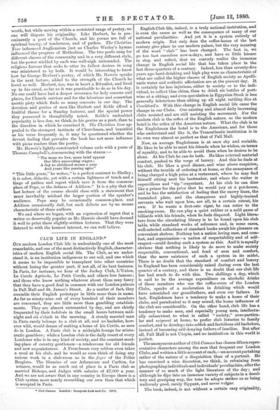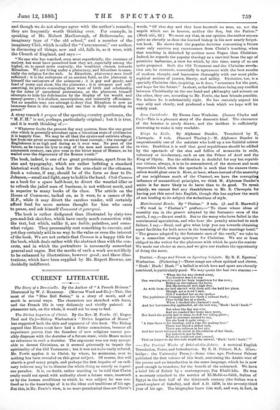CLUB LIFE IN ENGLAND.*
OUR modern London Club life is undoubtedly one of the most remarkable, and one of the most distinctively English, character- istics of modern English social life. The Club, as we under- stand it, is an institution indigenous to our soil, and one which it seems to be impossible to transplant into other countries without losing the greater part, if not all, of its best features. In Paris, for instance, we hear of the Jockey Club, L'Union, Le Cercle Agricole, Le Petit Cercle, and others less famous; and those who know nothing whatever about them may fancy that they have a good deal in common with our London palaces in Pall Mall and St. James's Street. As a matter of fact' they resemble their English prototype in little more than in name. As far as ninety-nine out of every hundred of their members are concerned, they are little more than gambling establish- ments. They are almost untenanted by day, and are chiefly frequented by their habitues in the small hours between mid- night and six o'clock in the morning. A steady married man in Paris rarely belongs to a club at all, and no bachelor, how- ever wild, would dream of making a home of his Cercle, as men do in London. A Paris club is a midnight lounge for aristo- cratic gamblers ; while a London club is the daily resort of every Londoner who is in any kind of society, and the constant meet- ing-place of country gentlemen—a rendezvous for old friends and new acquaintances. A Frenchman very seldom even takes a meal at his club, and he would as soon think of doing any serious work in a club-room as in the foyer of the Folies Bergeres. The libraries of our Athenwum and Carlton, for nstance, would be as much out of place in a Paris club as married Bishops, and Judges with salaries of £7,000 a year. And we are not aware that in any country in Europe there is a Club system more nearly resembling our own than that which is accepted in Paris.
* Club Cameo.. London: Sampson Low and Co. 1575.
English Club life, indeed, is a truly national institution, and is even the cause as well as the consequence of many of our national peculiarities. And yet it is a system entirely of modern origin. Not only does the coffee-house of the last. century give place to our modern palace, but the very meaning of the word " club " has been changed. The fact is, we go too fast ourselves now-a-days, and have so little leisure to stop and reflect, that we scarcely realise the immense change in English social life that has taken place in the last three-quarters of a century. Indeed, less than seventy-five years ago hard-drinking and high play were as characteristic of what are called the higher classes of English society as Apolli. naris water and wsthetic affectation are at the present day. It is certainly far less injurious, either to society or to the indi- vidual, to collect blue china, than to drink six bottles of port.. wine at a sitting; and even speculation in Egyptian Stock is less generally deleterious than sitting up all night rattling dice at Crockford's. With this change in English social life came the change in our Clubs. Our existing and almost daily increasing clubs assisted and are still assisting the movement. For the modern club is the reflex of the English nature, as the modern hotel is the reflex of the American nature. What the club is t,o the Englishman the hotel is to the American, and for those who understand and like it, the Transatlantic institution is in its own way almost as perfect as that of Pall Mall.
Now, an average Englishman is at once shy and sociable. He likes to be able to meet his friends when he wishes, on terms of equality, and to be able to avoid them when he desires to be alone. At his Club he can do both. He likes external material comfort, pushed to the verge of luxury. And this he finds at his club. He likes a good dinner, and wine above suspicion,. without the trouble of ordering it at home, or the annoyance of being charged a high price at a restaurant, where he may find himself sitting next his bootmaker, and where the waiter is supercilious and "tip "-expectant. At his club be can dine like a prince for the price that he would pay at a pot-house,. and he has the satisfaction of feeling that the snowy linen, the burnished plate, and the obsequious and highly-trained servants who wait upon him, are all, to a certain extent, his own. If he wants a first-rate cigar, he can retire to the smoking-room. He can play a quiet rubber or a mild game of billiards with his friends, when he feels disposed. Light litera- tare from the circulating library is to be found upon his club. table, while standard works of reference and, in some cases, well-selected collections of standard books await his pleasure on convenient shelves. Nothing but a nation loving ease, and com- fort, and organisation—a nation of respectability and of self- respect—could develop such a system as this. And it is equally obvious that nothing is likely to do more to make society respectable, conventional, and fond of ease and comfort, than the mere existence of such a system in its midst. There is no doubt that the standard of comfort and luxury in England has been considerably raised during even the last quarter of a century, and there is no doubt that our club life has had mach to do with this. Two shillings a day, which is said to be the average expenditure on alcoholic drinks of those members who use the coffee-room of the London Clubs, speaks of a moderation in drinking which would have astonished our grandfathers, and even our fathers. In fact, Englishmen have a tendency Co make a home of their clubs, and paradoxical as it may sound, the home influences of the club are considerable. On the other hand, club life has a. tendency to make men, and especially young men, intellectu- ally subservient to what is called "society," over-particu- lar and exigeant at home, to prefer club luxuries to family comfort, and to develope into selfish and fastidious old bachelors,. instead of becoming self-denying fathers of families. But after all, Pall Mall is not Utopia, and no institution in this world is perfect.
The anonymous author of Club Cameos has chosen fifteenrepre- sentative characters among the men that frequent our London Clubs, and written a little account of each,—an accountpartaking rather of the nature of a disquisition than of a portrait. He has exercised a wise discretion, we think, in refraining from photographing individuals and individuals' peculiarities, after the manner of so much of the light literature of the day; and although he dips into an immense variety of subjects in a desul- tory and gossiping way, the tone he adopts strikes us as being uniformly good, rarely flippant, and never vulgar.
The book, indeed, is not without a certain easy originality, end though we do not always agree with the author's remarks, they are frequently worth thinking over. For example, in speaking of Mr. Hubert Marlborough, of Heltercombe, an imaginary type of "the old school," and a member of the imaginary Club, which is called the "Caravanserai," our author, in discussing all things, new and old, falls in, as it were, with the Church of England, and says :—
" No one who has watched, even most superficially, the currents of society, but must have perceived how they set, especially among the higher, or, to speak more correctly, the wealthier classes, towards Ritualism. We are living under a plutocracy, and Ritualism is essen- tially the religion for the rich. In Ritualism, plutocracy Bees itself reflected : it is the caricature of an ancient faith, as the plutocrat is himself the caricature of the aristocrat ; it is gay and gaudy, and fond of pomp and show, like the plutocrat ; it is arrogant and self- asserting, its priests concealing their want of birth and scholarship by the robes of sacerdotal pretensions, as the plutocrat himself attempts to hide his deficiencies by the display of his wealth and money-power ; it is shallow, unscrupulous, and miserably effeminate. Yet no sensible man can attempt to deny that Ritualism is now an immense force in the country, and one that is daily extending its power."
A stray remark it vropos of the sporting country gentleman, the " M. F. H." is not, perhaps, particularly original ; but it is true, and it is worth thinking of :— " Whatever faults the present day may possess, from the one great vice which is generally attendant upon a luxurious state of civilisation it is happily free. We may be all that the cynics and satirists allege, but from one great accusation we are at least exempt,—the courage of Englishmen is as high and daring as it ever was. No poet of the future, as he tunes his lyre to sing of the men and manners of the nineteenth century, can give vent to the bitter sneer of Horace, as he wailed over the degeneracy of the Roman youth."
The book, indeed, is one of no great pretensions, apart from its size and typography, which are rather befitting a standard historical work than a book for the arm-chair or the ottoman. Such a volume, if any, should be of the form so dear to Dr.
Johnson,—small and light, easy to hold in the hand. Club Cameos as a book for a spare half-hour, to divert the wearied idler or
to refresh the jaded man of business, is not without merit, and is superior to many books of its class. The article on the
House of Commons, tacked on, as it were, to a cameo of the MY., while it may divert the careless reader, will certainly afford food for more serious thought for him who cares to pause, and ask himself Comment et pourquoi.
The book is rather disfigured than illustrated by sixty-two pen-and-Ink sketches, which have rarely much connection with -the text, but which, unlike it, are feeble, pointless, and some- what vulgar. They presumably cost something to execute, and yet they certainly add in no way to the value or even the interest of the book. We are not certain that Cameos is a happy title for the book, which deals rather with the abstract than with the con- crete, and in which the portraiture is necessarily somewhat
general and vague. But the merits of such a work are not likely to be enhanced by illustrations, however good ; and these illus- trations, which have been supplied by Mr. Rupert Browne, are decidedly indifferent.



































 Previous page
Previous page